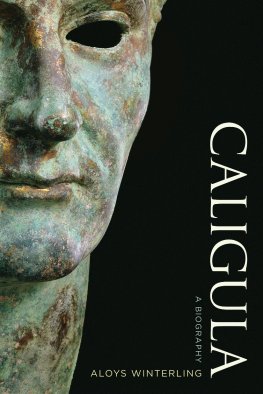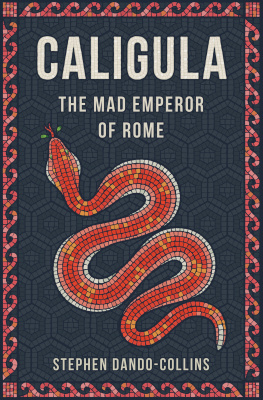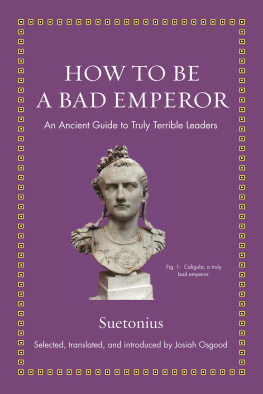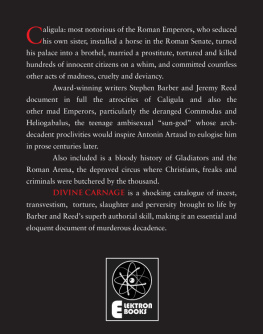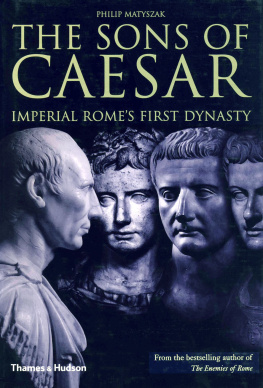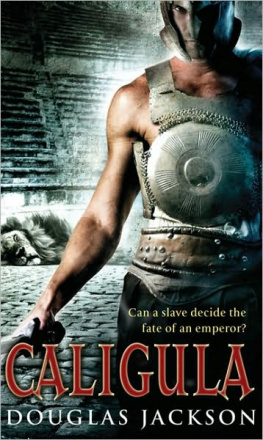CALIGULA
C. SUETONIOUS TRANQUILLUS
Caligula
Copyright 2013 Sheba Blake Publishing
All rights reserved.
ISBN: 978-1-304-09789-7
Contact us at support@shebablake.com
NOTE TO READERS
As part of our mission to publish great works of literary fiction and nonfiction, Sheba Blake Publishing has begun its publishing empire with some of the most popular and beloved classic eBooks. We are extremely dedicated to bringing to the forefront the amazing works of long dead and truly talented authors.
Sheba Blake Publishing has created its collection of numerous classic eBooks, specifically dedicated to bringing back in eBook form works of worthy authors. Included in our current and forthcoming list of some 450 titles includes A Christmas Carol, A Journey to the Center of the Earth, A Martian Odyssey, Adventures of Huckleberry Finn, Cinderella and the list continues.
The process to convert and distribute our eBook titles can be quite time consuming, but the work is beyond worth the effort, with us having some of the most colorful and delightful covers you have seen in a while. We also hope to eventually add audiobooks to our beautiful catalogue.
Our works are made available to the reading public in the form of eBooks compatible with all currently available eBook platforms, distributed both directly from Sheba Blake Publishings website and through various eBook resellers including Amazon, iBookstore, Barnes & Noble and Kobo.
Sheba Blake Publishing is like our second child, its very dear to us and we want more than anything to see it succeed and send it off into the world like the proud mamas we are! Sheba Blake Publishing is slowly becoming a beautiful reality to all readers. We greatly appreciate ANY and ALL support that has been given to us, and we love all of those dreaming readers who continue to purchase our titles and help us grow.
Cheers,
Sheba Blake Publishing
CAIUS CAESAR CALIGULA.
I. Germanicus, the father of Caius Caesar, and son of Drusus and the younger Antonia, was, after his adoption by Tiberius, his uncle, preferred to the quaestorship [377] five years before he had attained the legal age, and immediately upon the expiration of that office, to the consulship [378]. Having been sent to the army in Germany, he restored order among the legions, who, upon the news of Augustus's death, obstinately refused to acknowledge Tiberius as emperor [379], and offered to place him at the head of the state. In which affair it is difficult to say, whether his regard to filial duty, or the firmness of his resolution, was most conspicuous. Soon afterwards he defeated the enemy, and obtained the honours of a triumph. Being then made consul for the second time [380], before he could enter upon his office he was obliged to set out suddenly for the east, where, after he had conquered the king of Armenia, and reduced Cappadocia into the form of a province, he died at Antioch, of a lingering distemper, in the thirty-fourth year of his age [381], not without the suspicion of being poisoned. For besides the livid spots which appeared all over his body, and a foaming at the mouth; when his corpse was burnt, the heart was found entire among the bones; its nature being such, as it is supposed, that when tainted by poison, it is indestructible by fire. [382]
II. It was a prevailing opinion, that he was taken off by the contrivance of Tiberius, and through the means of Cneius Piso. This person, who was about the same time prefect of Syria, and made no secret of his position being such, that (252) he must either offend the father or the son, loaded Germanicus, even during his sickness, with the most unbounded and scurrilous abuse, both by word and deed; for which, upon his return to Rome, he narrowly escaped being torn to pieces by the people, and was condemned to death by the senate.
III. It is generally agreed, that Germanicus possessed all the noblest endowments of body and mind in a higher degree than had ever before fallen to the lot of any man; a handsome person, extraordinary courage, great proficiency in eloquence and other branches of learning, both Greek and Roman; besides a singular humanity, and a behaviour so engaging, as to captivate the affections of all about him. The slenderness of his legs did not correspond with the symmetry and beauty of his person in other respects; but this defect was at length corrected by his habit of riding after meals. In battle, he often engaged and slew an enemy in single combat. He pleaded causes, even after he had the honour of a triumph. Among other fruits of his studies, he left behind him some Greek comedies. Both at home and abroad he always conducted himself in a manner the most unassuming. On entering any free and confederate town, he never would be attended by his lictors. Whenever he heard, in his travels, of the tombs of illustrious men, he made offerings over them to the infernal deities. He gave a common grave, under a mound of earth, to the scattered relics of the legionaries slain under Varus, and was the first to put his hand to the work of collecting and bringing them to the place of burial. He was so extremely mild and gentle to his enemies, whoever they were, or on what account soever they bore him enmity, that, although Piso rescinded his decrees, and for a long time severely harassed his dependents, he never showed the smallest resentment, until he found himself attacked by magical charms and imprecations; and even then the only steps he took was to renounce all friendship with him, according to ancient custom, and to exhort his servants to avenge his death, if any thing untoward should befall him.
IV. He reaped the fruit of his noble qualities in abundance, being so much esteemed and beloved by his friends, that Augustus (to say nothing of his other relations) being a long time in doubt, whether he should not appoint him his successor, at last ordered Tiberius to adopt him. He was so extremely popular, that many authors tell us, the crowds of those who went to meet him upon his coming to any place, or to attend him at his departure, were so prodigious, that he was sometimes in danger of his life; and that upon his return from Germany, after he had quelled the mutiny in the army there, all the cohorts of the pretorian guards marched out to meet him, notwithstanding the order that only two should go; and that all the people of Rome, both men and women, of every age, sex, and rank, flocked as far as the twentieth milestone to attend his entrance.
V. At the time of his death, however, and afterwards, they displayed still greater and stronger proofs of their extraordinary attachment to him. The day on which he died, stones were thrown at the temples, the altars of the gods demolished, the household gods, in some cases, thrown into the streets, and new-born infants exposed. It is even said that barbarous nations, both those engaged in intestine wars, and those in hostilities against us, all agreed to a cessation of arms, as if they had been mourning for some very near and common friend; that some petty kings shaved their beards and their wives' heads, in token of their extreme sorrow; and that the king of kings [383] forbore his exercise of hunting and feasting with his nobles, which, amongst the Parthians, is equivalent to a cessation of all business in a time of public mourning with us.
VI. At Rome, upon the first news of his sickness, the city was thrown into great consternation and grief, waiting impatiently for farther intelligence; when suddenly, in the evening, a report, without any certain author, was spread, that he was recovered; upon which the people flocked with torches (254) and victims to the Capitol, and were in such haste to pay the vows they had made for his recovery, that they almost broke open the doors. Tiberius was roused from out of his sleep with the noise of the people congratulating one another, and singing about the streets,


